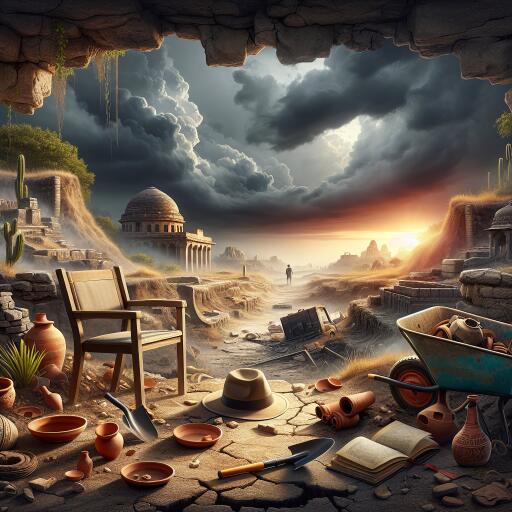Introduction
The archaeological site of Lothal, located in Gujarat, recently became the setting of a tragic accident that has profoundly impacted the academic and research community. A young and promising research scholar, Surabhi Verma, lost her life in a devastating incident that has left an indelible mark on the field of archaeology and environmental studies.
The Incident
During an active field study at the ancient site, Surabhi, a 23-year-old PhD student from the Indian Institute of Technology (IIT), and her associate professor, Yama Dixit, were involved in a grave accident. The pair were hard at work, collecting and analyzing soil samples that would aid in understanding the ramifications of climate change on the Indus Valley civilization when disaster struck. The trench they were examining unexpectedly caved in, burying both researchers under an avalanche of earth and debris.
Despite swift rescue efforts, the tragic outcome saw the loss of Surabhi, whose life was sadly cut short just as it was beginning to bloom with promise and potential. Her mentor, Yama Dixit, managed to survive the incident, but not without sustaining significant emotional and physical trauma.
The Research Endeavor
Surabhi and Professor Dixit were engaging in pivotal work that aimed to connect past climatic conditions with present challenges. The soil samples they were investigating could have provided critical insights into how ancient civilizations like the Indus Valley inhabitants adapted—or failed to adapt—to environmental changes. Their research was expected to contribute to the broader understanding of archaeological patterns related to climate shifts and human resilience, making their efforts extremely significant in today’s environmentally conscious age.
The Lothal Site
Lothal, a hub of ancient trade and maritime activity, holds immense historical significance as one of the prominent sites of the Indus Valley civilization. Its strategic location near the Sabarmati River made it a prime candidate for in-depth studies on ancient water management systems and their correlation to today’s climate concerns.
Emphasizing Safety in Fieldwork
This unfortunate incident underscores the urgent necessity for implementing and adhering to stringent safety protocols during archaeological and scientific fieldwork, often conducted in unpredictable and potentially hazardous environments. It serves as a stark reminder of the risks faced by researchers who dedicate their lives to unveiling the secrets of the past. Protective measures, including reinforced physical barriers, emergency response plans, and comprehensive safety training, are not merely precautions; they are imperative to prevent future tragedies.
Remembering Surabhi Verma
Surabhi Verma exemplified the spirit and curiosity that define great scholars. Her untimely death is not only a loss to her family and close colleagues but also to the wider academic world that might have greatly benefited from her future contributions. Her passion and dedication to understanding environmental dynamics and the rich history of ancient civilizations were evident in her commitment to her research. As the community mourns her loss, it also remembers her legacy—an inspiration for young researchers everywhere to follow their passions with vigilance and care.
Conclusion
In the aftermath of this tragedy, it is crucial for research organizations, academic institutions, and funding agencies to prioritize the well-being and safety of their researchers. Implementing robust safety protocols and fostering a culture of awareness and preparedness will not only honor the memory of those who have fallen but also support the future endeavors of those carrying the torch forward.
The tragic incident at Lothal will serve as a critical point of reflection on the importance of safety, reinforcing the need to balance the pursuit of knowledge with the imperative of ensuring safe and secure working conditions for researchers around the globe. Let Surabhi Verma’s memory be a guiding light towards safer and more conscientious exploration in the quest for understanding our world and its ancient inhabitants.










